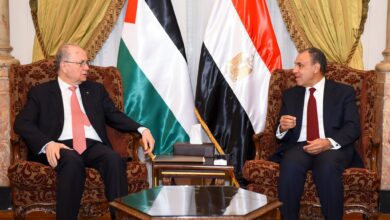Arab foreign ministers held discussions on Wednesday in an effort to hammer out a joint stance on US-backed efforts to re-launch deadlocked Palestinian-Israeli peace negotiations.
The talks come amid a diplomatic flurry, including intensified efforts by US President Barack Obama's Mideast envoy George Mitchell to persuade the Palestinians to accept new US proposals to jumpstart the stalled peace process.
Washington has acknowledged that it has failed to persuade Israel to halt settlement construction on Palestinian land, but has nevertheless urged the two sides to reopen talks.
Before the meeting, at the Cairo headquarters of the Arab League, ministers held bilateral consultations including separate discussions with Mitchell.
Arab diplomats who participated in the talks told Al-Masry Al-Youm that Mitchell had tried to convince some of the ministers to press Palestinian Authority President Mahmoud Abbas to return to the negotiating table.
The diplomats said that Arab ministers, for their part, had tried to persuade Mitchell to provide the Palestinians with assurances from Washington that the US would recognize an independent Palestinian state if the Israelis failed to halt settlement building.
US-sponsored direct Palestinian-Israeli talks broke down in September after Israeli Prime Minister Benjamin Netanyahu refused to renew a 10-month freeze on settlement construction in the West Bank.
Abbas has said that he would not hold face-to-face talks as long as Israeli settlements continued to mushroom across Palestinian land that they want for their state.
Abbas is scheduled to brief Arab ministers on his talks with the US administration during which he is expected to reiterate his position and seek Arab advice on the next step.
Ahead of the meeting, Mitchell met separately with Egyptian President Hosni Mubarak and Arab League chief Amr Moussa.
After his talks with Mubarak, he told reporters that Washington's goal was to help the Palestinians and Israelis reach a “framework agreement" dealing with key issues in the talks.
"In the days ahead, our discussions with both sides will be substantive, two-way conversations with an eye towards making real progress in the next few months on the key questions of an eventual framework agreement," Mitchell said.
This, however, is not accepted by Abbas, who wants to engage Netanyahu directly in talks on a final peace settlement.
A number of Arab countries–including Egypt–are seeking an "end game," meaning a final peace accord that includes an agreement on land, security, border and refugees.
Obama had previously said that he hoped the talks, which he personally endorsed, would yield an independent Palestinian state living side-by-side with Israel by 2011.
Abbas is reportedly asking Arab leaders to support an initiative to ask the United Nations Security Council to recognize his PA as an independent state with East Jerusalem as its capital.
Abbas appears to have been encouraged by public recognition this month of a Palestine state, within 1967 borders, by Brazil, Argentina and Uruguay.
If Washington refuses to apply pressure to Israel to stop settlement building, Abbas asks that it at least refrain from taking steps aimed at blocking the Palestinians from seeking such recognition from the UN Security Council.
In his opening address at the meeting, Qatari Foreign Minister Sheik Hamad bin Jassim al-Thani said that the Arabs should resort to the Security Council if the United States failed to support the Palestinian demands.
The United States, however, along with other western nations, is likely to veto any unilateral move to declare an independent Palestinian state.




